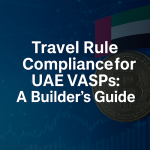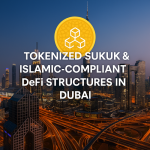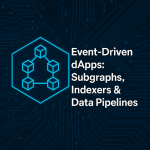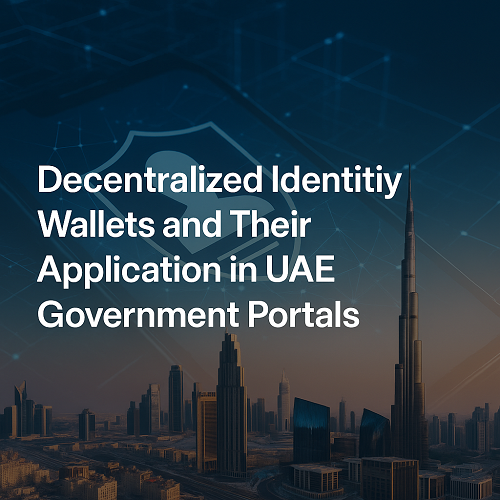Table of Contents
- Introduction
- Understanding Decentralized Identity Wallets
- How Decentralized Identity Works
- UAE’s Push Toward Blockchain-Powered Digital Identity
- Applications in UAE Government Portals
- Benefits of Decentralized Identity for Citizens and Residents
- Case Study: UAE Pass and Blockchain Integration
- Challenges and Regulatory Considerations
- Future of Decentralized Identity in the UAE
- FAQs
- Conclusion
- Websima Guidance
Introduction
In 2025, the UAE is strengthening its position as a global leader in digital transformation by adopting blockchain-powered identity systems and Web3 innovations. One of the most significant advancements is the integration of decentralized identity wallets, which empower users to own and control their data while securely accessing government and private-sector services. Besides, the use of digital wallet in UAE, increases the blockchain adoption across the country.
Adoption is already surging. UAE Pass, the country’s national digital identity platform, has surpassed 11 million registered users, enabling secure logins to over 5,000 government, semi-government, and private services (ITU). With the UAE Digital Government Strategy 2025 aiming for 100% digitization of public services and 90% citizen satisfaction, decentralized identity wallets are set to play a pivotal role in achieving this vision.
Big news out of the UAE
You can now pay for taxis with crypto, and $XRP is the only fully regulated digital asset in the country.
Crypto adoption isn’t the future, it’s already riding with you. pic.twitter.com/1HZGC1Mp0l
— John Squire (@TheCryptoSquire) June 24, 2025
Understanding Decentralized Identity Wallets
A decentralized identity wallet is a secure, blockchain-powered application that allows users to store, manage, and share verifiable credentials issued by trusted entities. Unlike centralized databases, these wallets:
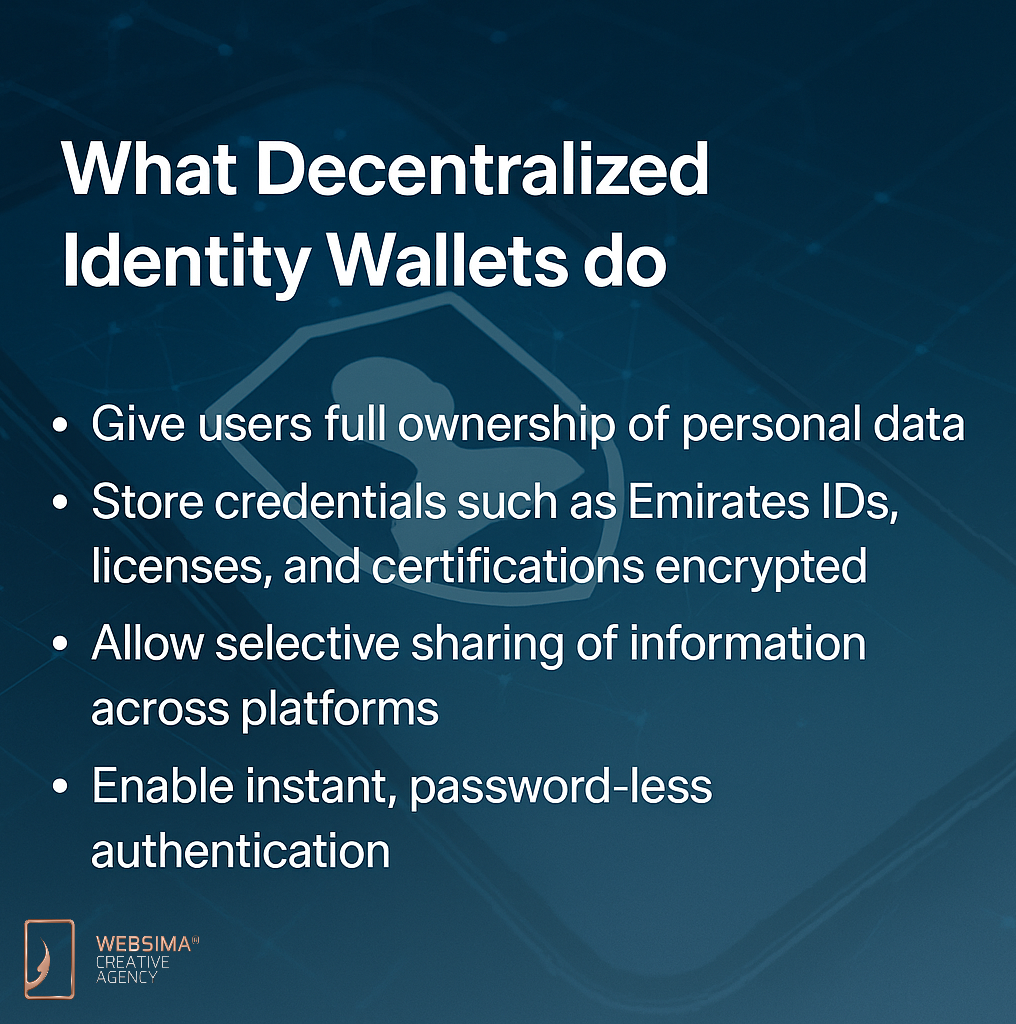
- Give users full ownership of personal data
- Store credentials such as Emirates IDs, licenses, and certifications encrypted
- Allow selective sharing of information across platforms
- Enable instant, passwordless authentication
Built on self-sovereign identity (SSI) principles, these wallets eliminate reliance on centralized authorities, enhancing both privacy and security.
How Decentralized Identity Works
Decentralized identity relies on three core components:
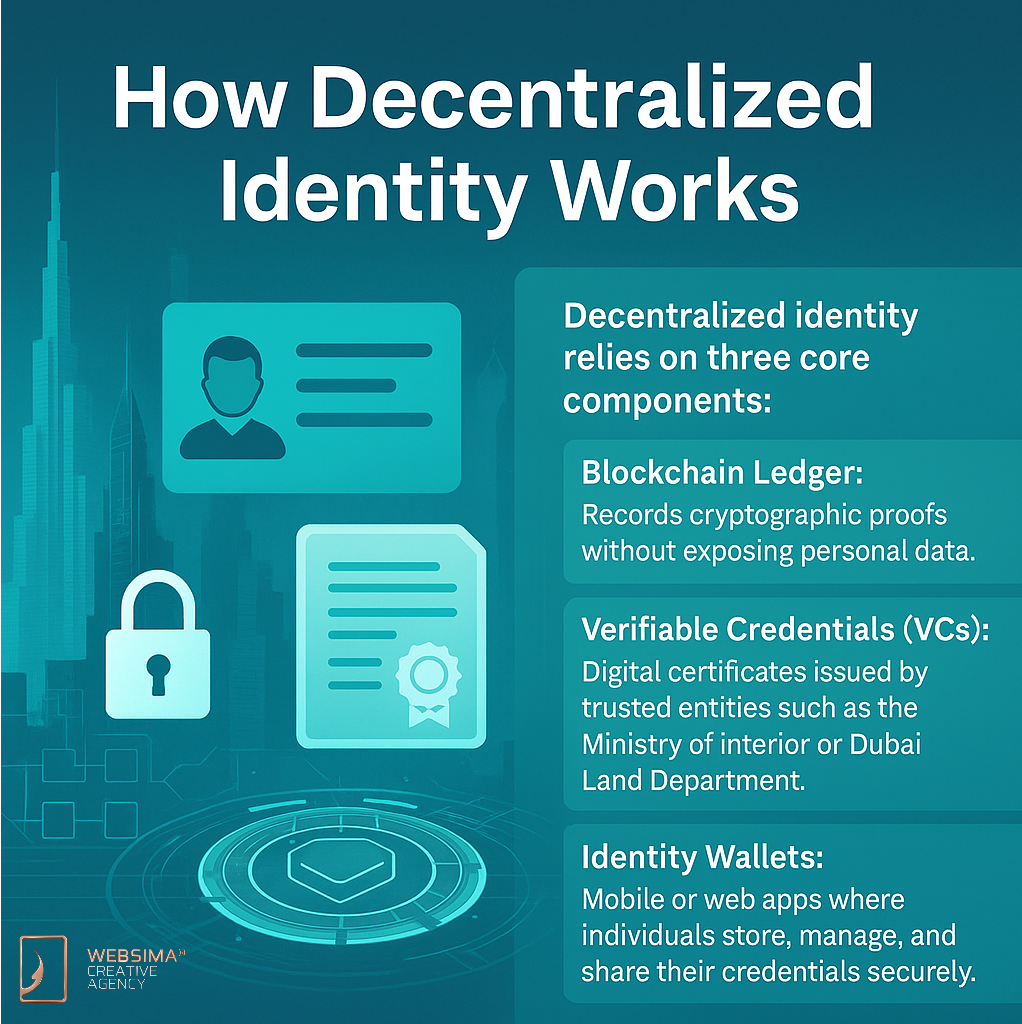
- Blockchain Ledger: Records cryptographic proofs without exposing personal data.
- Verifiable Credentials (VCs): Digital certificates issued by trusted entities such as the Ministry of Interior or Dubai Land Department.
- Identity Wallets: Mobile or web apps where individuals store, manage, and share their credentials securely.
Example: A resident applying for a property title through DLD’s e-services can authenticate instantly using their wallet, bypassing manual document checks.
UAE’s Push Toward Blockchain-Powered Digital Identity
The UAE has positioned itself at the forefront of Web3 adoption through various government-backed initiatives:
- UAE Pass: Integrated with 6,000+ services nationwide, it’s already becoming the digital identity backbone (UAE Pass).
- Dubai Blockchain Strategy: Targets 50% of government transactions to run on blockchain, expected to save AED 11 billion (~US$3 billion) annually through reduced paperwork (WEF Report).
- ADDA Initiatives: Abu Dhabi’s pilots explore secure decentralized identity for healthcare, education, and real estate services.
- VARA Standards: Dubai’s Virtual Assets Regulatory Authority is developing frameworks to ensure decentralized identities align with cross-platform data-sharing compliance.
Applications in UAE Government Portals
Decentralized identity UAE solutions are already transforming how citizens and residents access public services:
- E-Government Portals: Unified authentication for DubaiNow, TAMM, and UAE Pass, eliminating multiple logins.
- Real Estate Transactions: Dubai Land Department is integrating blockchain for instant buyer/seller verification.
- Healthcare: Faster patient onboarding and cross-hospital record portability.
- Education: Seamless degree verification across universities and employers.
- Financial Services: Simplified, decentralized KYC processes for compliant onboarding in banking and investment services.
The UAE’s digital adoption rate stands at 61.3%, well above the global average of 30%, according to a BCG study. This underscores why decentralized identity wallets are essential for handling the sheer scale of service demand.
Benefits of Decentralized Identity for Citizens and Residents
- User Control: Individuals decide which data to share and when.
- Increased Privacy: Minimizes risks of centralized data breaches.
- Seamless Authentication: Single-wallet access to thousands of services.
- Cross-Platform Compatibility: Use one identity across government and private ecosystems.
- Regulatory Alignment: Built to comply with frameworks like GDPR and UAE’s Federal Data Protection Law.
Case Study: UAE Pass and Blockchain Integration
The UAE Pass app, a cornerstone of the country’s digital identity infrastructure, is integrating blockchain to enhance security and interoperability:
- Passwordless access to services across 6,000+ entities
- Paperless verification for property deeds and Emirates ID issuance
- Cross-border identity recognition initiatives within the GCC region
By embedding blockchain-based proofs, UAE Pass is setting the stage for fully decentralized identity UAE systems in the near future.
Challenges and Regulatory Considerations
Despite rapid advancements, several challenges remain:
- Regulatory Coordination: Harmonizing standards across VARA, DIFC, ADGM, and federal authorities.
- System Interoperability: Ensuring wallets work seamlessly across diverse government and private platforms.
- User Awareness: Educating residents about wallet security and identity control.
- Data Protection: Maintaining compliance with global privacy frameworks while enhancing usability.
Future of Decentralized Identity in the UAE
By 2030, decentralized identity wallets are expected to:
- Replace passwords entirely for UAE government services
- Enable cross-border identity sharing within GCC agreements, paves the way for cross-border crypto payment for Dubai e-commerce.
- Facilitate tokenized property ownership and on-chain real estate transfers
- Integrate with CBDCs for seamless, identity-verified transactions
With UAE already holding a 41.6% market share in blockchain identity management within the region and growing at a CAGR of 83.3% (DataBridge Research), the country is on track to lead global benchmarks.
FAQs
Is UAE Pass considered a decentralized identity solution?
Partially. UAE Pass uses blockchain proofs but fully self-sovereign wallets are expected by 2026.
How secure are decentralized identity wallets?
Extremely secure — data is encrypted, and blockchain ensures tamper-proof verification.
Do expatriates need decentralized identity wallets?
Yes. They’ll be critical for property registration, KYC verification, and accessing healthcare services.
Will these wallets integrate with private services?
Yes, government-backed APIs already support integration with banks, telecom providers, and other private platforms.
Conclusion
The UAE is spearheading the global shift toward decentralized identity wallets, embedding blockchain-powered authentication into e-government portals and private-sector platforms alike. With over 11 million UAE Pass users and a target of 100% digital public services by 2025, the groundwork for widespread wallet adoption is firmly in place.
For individuals, this transformation offers secure, frictionless access to thousands of services while keeping control of their personal data. For businesses and developers, it unlocks unprecedented opportunities to build compliant, interoperable Web3 solutions aligned with Dubai’s blockchain-powered vision.
Websima Guidance
At Websima, we help innovators, enterprises, and startups leverage decentralized identity frameworks to build next-generation Web3 solutions in Dubai. From identity wallet development to smart contract integrations and e-government API connectivity, we ensure your products are secure, compliant, and future-ready.
As the UAE accelerates its digital government strategy, we empower businesses to thrive in this evolving ecosystem by providing technical expertise and regulatory alignment under frameworks like VARA, DIFC, and ADGM.
Contact Websima today to explore how we can help you develop, integrate, and scale decentralized identity solutions tailored to Dubai’s dynamic Web3 ecosystem.

